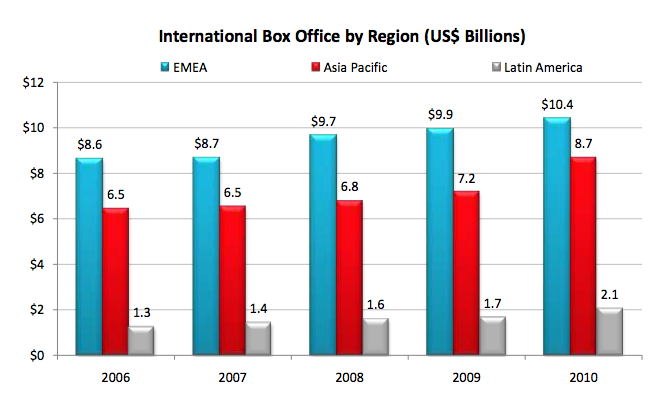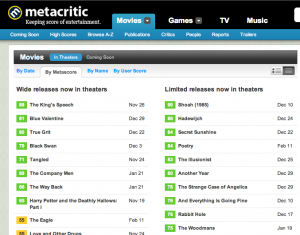A few years ago, when I was writing for THE HOLLYWOOD REPORTER, I remember trying to convince the powers-that-be to put more resources into Asia because Asia’s box office was much bigger than most people realized. I did some math and figured out that in 2006, Asia represented a little over $6 billion at the box office, compared to about $8 billion in Europe and $11 billion in North American.
Despite those numbers, I would say THR’s focus was about 70% America, 20% Europe, 5% Asia, and 5% everything else (just a rough estimate). Clearly those ratios do not really match up, but I could tell that nothing was going to change any time soon, which made leaving THR much easier.
(For the record, I loved the people I worked with, but was frustrated by the bureaucratic inertia and the lazy thinking by the higher-ups).
Well, those trends have just gotten more pronounced. The Motion Picture Association of America just released a report on 2010’s world box office, and Asia is stronger than ever. Europe (including the Middle East and Africa) has grown to $10.4 billion, and Asia is now $8.7 billion (and Latin America is a blistering $2.1 billion). Of the growth since 2006, 40 percent has come from Asia.

America and Canada have grown to $10.6 billion from $9.2 billion, but most of that is from 3D — regular 2D box office actually fell to $8.4 billion.
In case you are interested in such things, the USA/Canada market had its best year in terms of admissions in 2002, when it sold 1.57 billion tickets, as opposed to 1.34 billion in 2010 (the worst year in the past decade).
Of course, as far as the movie publications are concerned, the big issue is not box office but marketing spending — how much the Asian movie companies are spending on publicizing their movies outside of their home territories. And that is not much. Additionally, the numbers out of much of Asia are pretty opaque: China has swung way too much over the years, and who knows what is going on in India. But Japan remains the world’s No. 2 movie market, and Korea is close to $1 billion.
Clearly, the person whose business strategy more closely aligns with global spending (maybe these guys?) is going to make a lot of money. But for now, most people’s focus remains on America first, and the West in general second. Asia gets a lot of lip service, but continues to be really underrepresented




